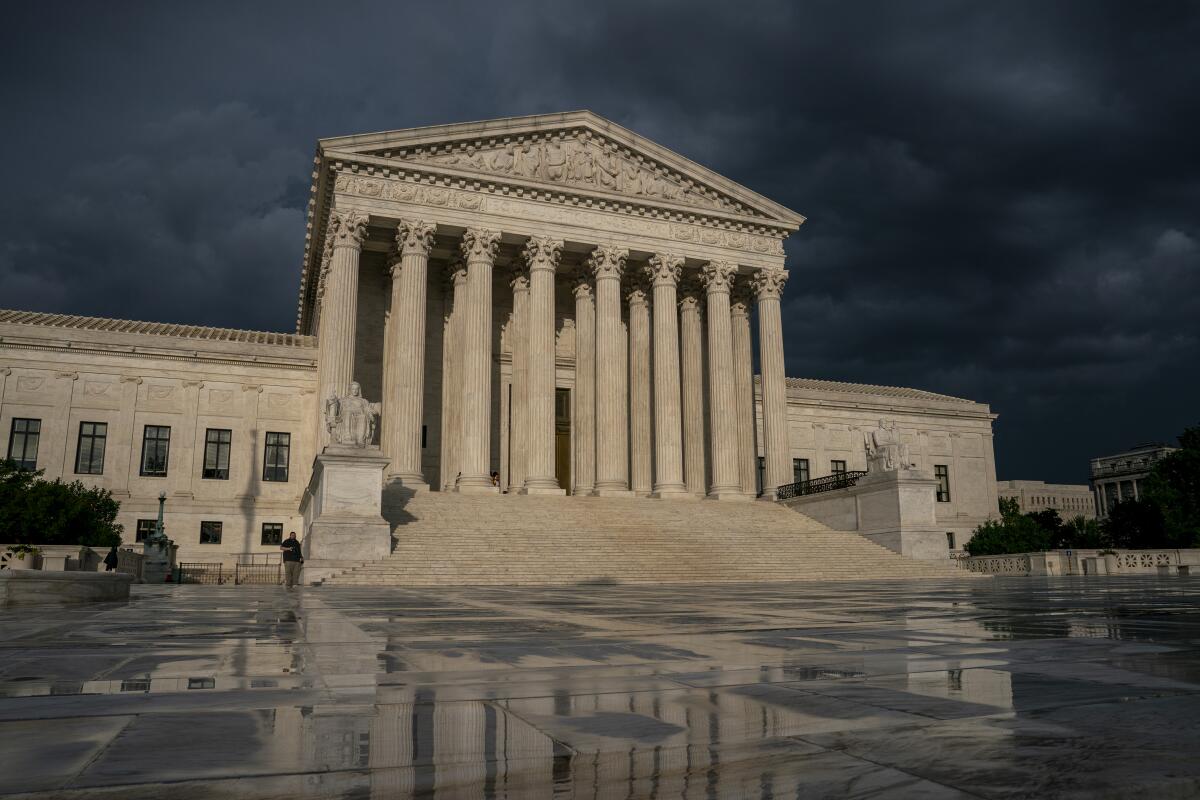Biden lawyers tell Supreme Court it’s time to end Trump policy at the border

- Share via
WASHINGTON — President Biden’s lawyers urged the Supreme Court on Tuesday to reject an emergency appeal from Republican-led states and end the Trump-era COVID-19 policy that turned away migrants at the border who were seeking asylum.
But Solicitor Gen. Elizabeth B. Prelogar also asked the high court to keep in place the so-called Title 42 border restrictions for another week to give the administration time to prepare for more intensive screening of migrants at the border.
The border restrictions were set to expire on Wednesday, but Chief Justice John G. Roberts Jr. paused that deadline indefinitely on Monday.
The Title 42 policy, based on a long-standing public health emergency law, was imposed by the Trump administration during the COVID-19 pandemic to prevent infected people from entering the country.
A federal judge said the policy can no longer be justified since the health crisis is easing. When he ordered that the restrictions be lifted by Wednesday, the Republican states sued to keep them in place.
In a filing Tuesday with the Supreme Court, Biden attorneys agreed that the time had come to end the COVID-related rules.
“The government recognizes that the end of the Title 42 orders will likely lead to disruption and a temporary increase in unlawful border crossings,” Prelogar said. “The government in no way seeks to minimize the seriousness of that problem. But the solution to that immigration problem cannot be to extend indefinitely a public-health measure that all now acknowledge has outlived its public-health justification.”
The Trump administration policy authorized agents to expel migrants without giving them an asylum hearing.
In its place, the Biden administration says it will be doing speedy hearings to determine which migrants can seek asylum based on a credible fear of persecution.
The justices have yet to decide whether to grant the appeal from Arizona and 18 other GOP-led states, and perhaps hear arguments on whether the Trump policy can be ended.
Until now, the court’s conservatives have been skeptical of the Biden administration’s reliance on the pandemic to enforce its rules.
In a 6-3 decision, the court revoked a moratorium on housing evictions that Biden had maintained as a pandemic measure. By the same vote, the conservative majority blocked a Labor Department rule that would have required large employers to enforce a vaccine mandate.
Earlier this month, the court put on hold Biden’s plan to wipe out millions of student loans, which was based on his emergency authority to cope with the pandemic. The justices will hear arguments in February on the legality of the proposed loan forgiveness.
But in the immigration dispute, the tables are turned. It is the conservative states that argue the pandemic-related health measure known as Title 42 must remain in force. The Democratic administration disagrees.
This year, two federal judges handed down conflicting rulings on Title 42, and both decisions were based on the Administrative Procedure Act, not federal immigration law.
In May, Judge Robert Summerhays, a Trump appointee in Louisiana, ruled for more than 20 Republican-led states and said the Biden administration may not repeal its use of Title 42. Doing so, he said, would be “arbitrary and capricious” and violate the APA because the administration did not seek formal comments in advance.
In November, Judge Emmet G. Sullivan, a Clinton appointee in Washington, ruled for the ACLU and immigrants’ rights advocates and said it was “arbitrary and capricious” under the APA for the administration to still rely on Title 42 long after the COVID emergency has faded. Now the harm to immigrants seeking asylum outweighs any health benefit, he said.
Sullivan agreed to have his decision take effect in five weeks, making Dec. 21 the deadline.
More to Read
Get the L.A. Times Politics newsletter
Deeply reported insights into legislation, politics and policy from Sacramento, Washington and beyond. In your inbox three times per week.
You may occasionally receive promotional content from the Los Angeles Times.











